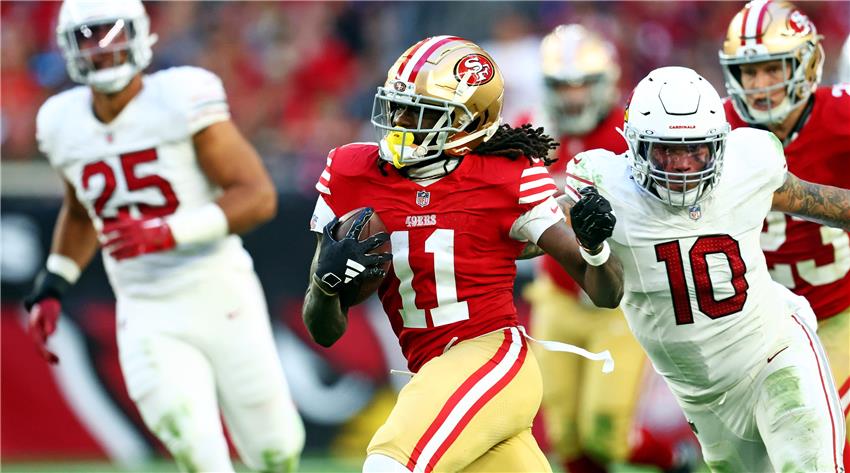
Are AI analytics affecting the NFL draft?
Artificial intelligence analytics has changed sports as we know them. This sophisticated way of processing and understanding data has taken sports to another level, allowing athletes and coaches to optimize every little aspect of training, recovery and discovery.
The NFL draft is no exception. Despite what most people think, AI analytics is having a huge impact on the rankings of players as well as on the players themselves. This goes without mentioning the technology having an influence over which players teams pick.
Today, we explore how AI analytics are affecting the NFL draft and look at some practical examples in the real world. Let's get right into it.
Data-driven decisions
One of the main ways that AI analytics are affecting the NFL draft is by changing the way teams buy players. In the past, teams would see the rankings and just go for the best-ranked players in the draft that they could afford. Take Luther Burden, for example. Usually, any teams that have the finances would have their eye on Burden considering he is the number one pick.
However, now that AI analytics have entered the fray, things don’t work this way anymore. Teams are now able to crunch the numbers to find out who is the best choice based on statistics, factoring in value for money and specific aspects that their team requires.
Of course, teams still go for the players with the highest rank if they are a good fit and to show their dominance, but it’s not as big of a deal.
AI also affects how players are ranked in the first place. In the past, players were ranked based on reputation. Statistics weren’t as much of a factor. It was mostly based on who had the most hype and who had the largest number of fans. Now, statistics play a much bigger role.
This can be a good or bad thing, depending on who you ask. The rankings now reflect the best players statistically, while also factoring in reputation and hype, but it can leave some players behind who would have otherwise been near the top.
The human element
While AI analytics have undeniably changed the way the NFL operates, it’s important to note that the human element is still present. Many fans and players feel like relying too much on AI is unnatural and makes the draft feel less fun. As with most sports, there has been quite a bit of controversy surrounding the use of AI in the NFL, leading rule-makers and team leaders to make changes.
This is why most teams don’t rely solely on AI. They use it as a tool alongside regular investigation, not as the sole reason for picking a player. It’s primarily used as an initial way to rule out certain players, with in-person scouting remaining the primary decision-maker.
This is because stats can only tell a team one part of the picture. A player can have incredible stats and look like the perfect fit for a team, but if they turn out to be rude or hard to work with when being scouted, the team is likely to rule the player out.
There’s also a multitude of other factors that could make a team choose a player even if their stats aren’t the best. Leadership traits or a willingness to learn can’t be seen with AI, and these aspects often matter much more than stats as they aren’t easy to teach. A player can always improve their stats, but developing a new trait is usually incredibly difficult if it isn't naturally a part of their personality.
It’s the same reason why knowing where to bet can be difficult for fans, as reviews and stats, such as how many sports a betting site offers, only give you part of the picture.
AI can only take you so far, and for both practical and ethical reasons, teams try not to rely solely on AI when it comes to decision making. However, to some extent, it is necessary.
Case studies
While most teams now use advanced AI analytics to some extent, some have proven its utility on the grand stage. One such example is the Baltimore Ravens. The Ravens have leaned more into AI than most when it comes to their strategy surrounding the NFL draft. They have even used predictive models to assess which players could be undervalued, who have then gone on to become big contributors to the team.
The San Francisco 49ers have also embraced AI analytics, albeit to a lesser extent. They use AI analytics extensively in the player evaluation process, giving them an advantage and allowing them to build a more competitive roster.
These are just two of the many examples. The Baltimore Ravens and San Francisco 49ers are the main teams that have made headlines for using AI in the NFL draft, but most teams do it. If they don’t, they will quickly fall behind.
The reality is that as teams begin to use AI more, others will also have to adopt it more extensively just to keep up. It’s a complete paradigm shift, and whether you agree with it or not, AI will likely be here to stay in the NFL draft.
Conclusion
We hope we have been able to give you better insight into how AI analytics are affecting the NFL draft. AI analytics are causing a wide range of changes in the NFL draft, influencing the rankings, how teams choose players and optimizing finances and decision-making. Is this a good thing? Well, it depends on who you ask.
AI analytics undoubtedly leads to better decisions by teams and a higher level of performance from players. However, you could also argue that it’s not natural. Some people believe this is not the way the game is supposed to be played. Regardless, it looks like AI analytics are here to stay for the time being. We might as well enjoy the positives that come with it.
